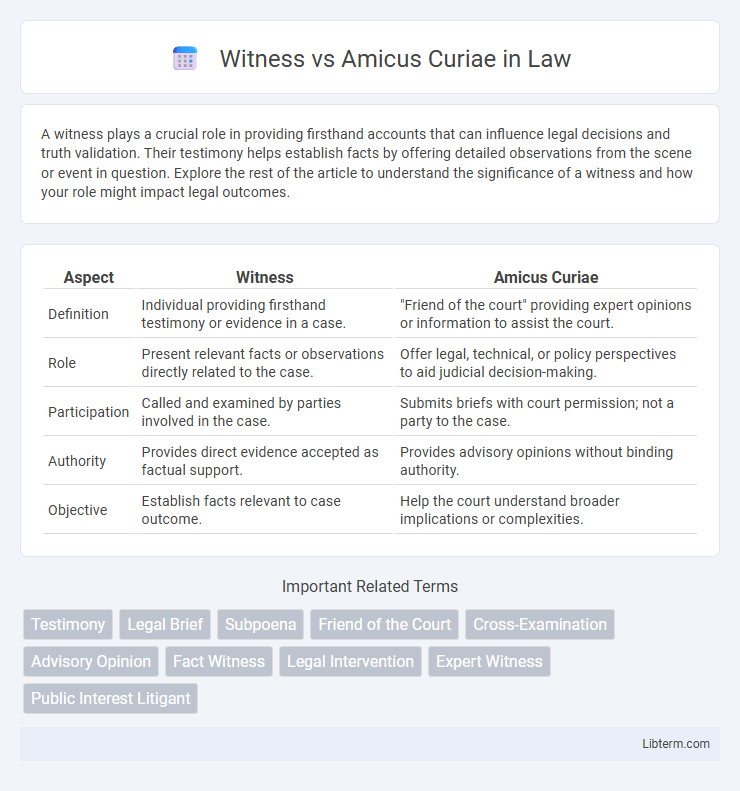A witness plays a crucial role in providing firsthand accounts that can influence legal decisions and truth validation. Their testimony helps establish facts by offering detailed observations from the scene or event in question. Explore the rest of the article to understand the significance of a witness and how your role might impact legal outcomes.
Table of Comparison
| Aspect | Witness | Amicus Curiae |
|---|---|---|
| Definition | Individual providing firsthand testimony or evidence in a case. | "Friend of the court" providing expert opinions or information to assist the court. |
| Role | Present relevant facts or observations directly related to the case. | Offer legal, technical, or policy perspectives to aid judicial decision-making. |
| Participation | Called and examined by parties involved in the case. | Submits briefs with court permission; not a party to the case. |
| Authority | Provides direct evidence accepted as factual support. | Provides advisory opinions without binding authority. |
| Objective | Establish facts relevant to case outcome. | Help the court understand broader implications or complexities. |
Introduction to Witness and Amicus Curiae
A witness provides direct, firsthand evidence or testimony relevant to the facts of a case, based on personal knowledge or observation. An amicus curiae, or "friend of the court," is a third party who offers information, expertise, or insight to assist the court in understanding broader legal or policy issues without being directly involved in the litigation. Both play distinct roles in the judicial process, with witnesses contributing factual evidence and amicus curiae influencing legal reasoning.
Definitions: Who is a Witness?
A witness is an individual who provides firsthand testimony or evidence based on personal knowledge or experience directly related to the case, often present during the event in question. Witnesses are called to offer factual information under oath, helping the court establish the truth of disputed facts. Their role contrasts with amicus curiae, who do not provide evidence but offer expert opinions or legal perspectives to assist the court.
Definitions: What is Amicus Curiae?
An Amicus Curiae, or "friend of the court," is a person or organization not party to a case who offers information, expertise, or insight relevant to the matter to assist the court in making a more informed decision. Unlike a witness, who provides firsthand testimony or evidence based on personal knowledge, an Amicus Curiae submits legal briefs or arguments to clarify broader legal issues or public interests. Courts often consider Amicus Curiae submissions to gain perspectives beyond the immediate interests of the parties involved in litigation.
Historical Background and Evolution
The roles of witness and amicus curiae have distinct historical backgrounds rooted in legal systems evolving over centuries. Witnesses have long been integral to fact-finding in judicial proceedings, with origins tracing back to ancient legal codes such as Hammurabi's Code, which emphasized firsthand testimony. The amicus curiae, or "friend of the court," emerged later during English common law to provide courts with expert insight or broader legal perspectives, evolving significantly in modern appellate and Supreme Court contexts to influence judicial decision-making beyond parties directly involved.
Roles and Responsibilities of a Witness
A witness provides firsthand testimony based on personal knowledge or observation relevant to the case, ensuring factual accuracy and reliability in court proceedings. Their primary responsibility is to recount events truthfully, answer questions posed by attorneys, and clarify details under oath to assist the judge or jury in establishing facts. Unlike an amicus curiae, who offers expert opinion or legal information to aid the court's understanding, a witness directly contributes evidence specific to the case's circumstances.
Functions and Duties of Amicus Curiae
Amicus curiae serves to assist the court by providing expert knowledge, legal arguments, or relevant information not fully represented by the litigants, enabling more informed judicial decisions. Unlike witnesses who offer firsthand evidence, amicus curiae presents impartial perspectives to clarify complex issues, interpret legal principles, and highlight broader public interests. Their duties include submitting briefs, suggesting legal standards, and ensuring the court considers all pertinent viewpoints before ruling.
Key Differences Between Witness and Amicus Curiae
A witness provides direct evidence or testimony based on personal knowledge relevant to the case, whereas an amicus curiae offers expert opinions or legal perspectives to assist the court without being a party to the litigation. Witnesses are subject to cross-examination and must adhere to factual accuracy, while amici submit briefs to highlight broader legal or public interest issues. The role of witnesses centers on factual contribution, contrasting with amicus curiae's advisory role in legal argumentation.
Legal Status and Admissibility
A witness is an individual who provides direct testimony based on personal knowledge or observation, holding a recognized legal status essential for evidence admissibility in court proceedings. An amicus curiae, or "friend of the court," is a non-party invited to offer expertise or information that may aid the court's understanding, but does not present testimonial evidence or hold the formal role of a witness. Courts determine admissibility differently; witness testimony is subject to strict evidentiary rules, while amicus briefs or opinions are accepted at the court's discretion to supplement legal arguments.
Importance in Judicial Proceedings
Witnesses provide firsthand testimony based on personal knowledge, serving as direct evidence crucial to establishing facts in judicial proceedings. Amicus curiae, or "friends of the court," contribute expert opinions or legal insights to assist judges in understanding complex issues beyond the parties' arguments. Both roles enhance the accuracy and depth of judicial decisions, with witnesses grounding facts in reality and amicus curiae enriching legal analysis.
Comparative Analysis and Conclusion
A witness provides direct evidence based on personal knowledge or observation, whereas an amicus curiae offers expert opinions and legal insights to assist the court without direct involvement in the case. Witness testimony is fact-driven and subject to cross-examination, while amicus briefs present broader legal arguments to influence judicial reasoning. The complementary roles highlight that witnesses establish factual foundations, and amicus curiae contribute specialized perspectives, collectively enhancing the court's decision-making process.
Witness Infographic

 libterm.com
libterm.com